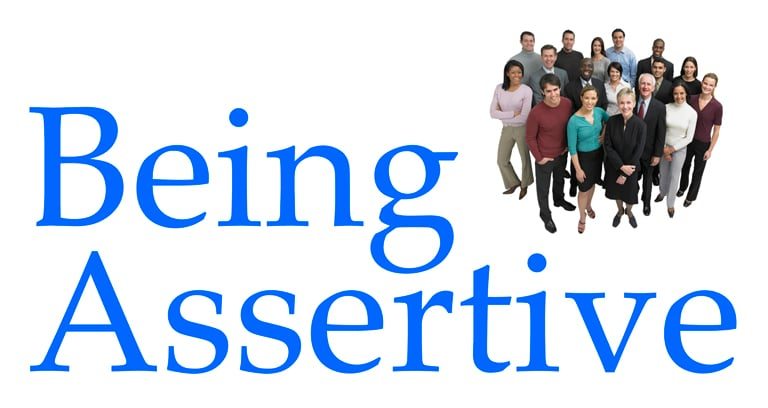Expressing your thoughts, feelings, and opinions and standing up for your rights is important. You are your first and biggest supporter, so it’s important that you speak up for yourself. Whether you are an unassertive (passive) person or an over assertive (aggressive) person, it is possible to change through right techniques and guidance. But there is a distinction between expressing yourself in a self-confident manner (being assertive) and forcing your ideas on others and intimidating them (being aggressive) which is very important to understand.
Being assertive is a very important tool in your personal life and professional life to earn people’s respect and refrain from hurting other directly or indirectly.
What is Assertiveness?
According to Merriam-Webster Dictionary Assertive means confident in behavior or style or disposed to or characterized by bold or confident statements and behavior.
Oxford English Dictionary gives the meaning of to assert as to state an opinion, claim a right, or establish authority. If you assert yourself, you behave in a way that expresses your confidence, importance or power and earns you respect from others. Assertiveness is an important quality and a very useful psychological tool in developing a bold and smart personality.
Assertiveness can be explained as standing up for your right to be treated fairly. It is expressing your opinions, needs, and feelings, without ignoring or hurting the opinions, needs, and feelings of others. The tendency of people to be liked and thought of as ‘nice’ and ‘easy to get along with’, they often keep their opinions to themselves, especially if there is a conflict of opinions with other people’s opinion. But this sometimes leads to being taken advantage of by people who are not as nice or considerate and can cause a lot of problems like work overload and depression to start with. Asserting yourself will stop others from cheating you and you from cheating yourself out of what you deserve. Being assertive improves our self-esteem and make us efficient.
Some of the general traits of being assertive are:
- Starting,Changing and Ending conversations when need be
- Sharing opinions, experiences and feelings with others.
- Asking for favors and making request
- Declining others request if it’s too demanding or there is a conflict of interest
- Questioning rules and traditions that are unfair or those that don’t make sense
- Addressing problems and thing that bothers you
- Being firm to defend your rights
- Expressing positive and negative emotions.
Some of the general techniques of Assertiveness are:
Fogging
Fogging is a useful technique if people are behaving in a manipulative or aggressive way. Rather than arguing back, fogging aims to give a minimal, calm response using terms that are placating but not defensive, while at the same time not agreeing to meet demands. Fogging involves agreeing with any truth that may be contained within statements, even if critical. By not responding in an expected way, in other words by being defensive or argumentative the other person will cease confrontation as the desired effect is not being achieved.
Fogging is named so because the individual acts like a ‘wall of fog’ into which arguments are thrown, but not returned.
The Stuck Record Technique
The Stuck Record technique employs the key assertive skill of ‘calm persistence‘. It involves repeating what you want, time and time again, without raising the tone of your voice, becoming angry, irritated, or involved in side issues. Continually repeating a request will ensure the discussion does not become side-tracked and involved in an irrelevant argument. The key is to stay calm, be very clear in what you want, stick to the point and not give up. Accept a compromise only if you are happy with the outcome.
Self Realization
Assertiveness is something that is developed and strengthen over time. Practicing assertive behavior regularly and reminding yourself that you have value is an important way to build that assertiveness.
One technique can be reviewing the following statements on a regular basis to remind yourself that your thoughts and opinions are important. Every time you agree with these statements, you’re building your assertive skills.
- I am honest and direct about my thoughts and feelings.
- I speak up and share my views if I disagree with others’ opinions.
- I am confident about my opinions and decisions.
- I am able to accept that someone else may have a better idea or solution to a problem than I do.
- I can accept positive criticism and suggestions.
- I ask for help when I need it.
- I am able to turn down requests that seem unreasonable or unfair.
- I directly address things that bother me.
- I speak confidently about things that matter a lot to me.
- I consider my needs as important as others.
You Might Want To Read:
Thinkiit Iit Jee Lectures Co Ordinate Geometry 3, B M R Sc English Communication Skills Mock Test Paper 3, Karnataka Public Service Commission Public Administration Mock Test Paper 5, Distance Work, Jnu Ph D M Phil Environmental Sciences, Haryana Board Class 10 Social Science Question Paper 5 2008, Home Science Question Paper 4 2015, Ugc Net Kashmiri Mock Test Paper 33, Gate Hand Written Notes Electronics Communication Engineering Digital Electronics 2, Delhi University M A Hindi 1St Year Mock Test Paper 1










Like what you read? Give author a thumbs up?
Bookmark this article to read later, drop a remark in comment section and share with your friends..